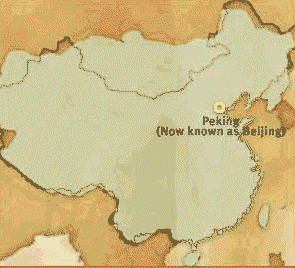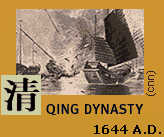The Qing Dynasty 1644-1900

 CNN explanation: Manchu armies moving south from their homeland conquered China to establish the Qing,
or "pure" dynasty. For about 150 years, the Qing presided over a
relatively prosperous time. But pressure by Western nations for trade with China
brought about the Opium Wars in the mid-1800s -- the first of a series of
humiliations for the Qing.
CNN explanation: Manchu armies moving south from their homeland conquered China to establish the Qing,
or "pure" dynasty. For about 150 years, the Qing presided over a
relatively prosperous time. But pressure by Western nations for trade with China
brought about the Opium Wars in the mid-1800s -- the first of a series of
humiliations for the Qing.
The latter half of the 19th century also saw a
series of uprisings, especially the devastating Taiping Rebellion, which claimed
millions of lives. Japanese forces defeated China during a brief war in 1894-95.
The anti-Western Boxer Rebellion of 1900 was crushed by Western troops --
leading to further weakening of the Qing. The dynasty finally collapsed in 1911
-- after which a Chinese Republic was briefly established.
Manchus and Imperialism: The
Qing Dynasty 1644-1900
Jurchen origins beyond the Wall
Nurchaci's Banner system (8
Manchu, 8 Mongol, and 8 Chinese)
Mongolian alphabet used to write
Manchu and translate the Ming legal code and other Chinese classics.
Manchu hairstyle. (Mr. Lu says
that even today, the Chinese use a phrase similar to the English "kicking
the bucket," "to cut off the pigtail".
Conquering the south: the massacre
at Yangzhou
Modern Chinese borders including
the "protectorate" of Tibet
*Kangxi (1662-1722) Used the
banner system in administering the government as well. Tolerated diversity
including Christianity.
Jesuits -- Portuguese educated
missionaries whom Kangxi patronized in exchange for Western scientific
information. Jesuits appointed to direct the Imperial board of Astronomy. Mateo
Ricci reconciled Confucianism with Christianity. The Pope wanted more control,
so Kangxi kicked them all out.
see Jonathan Spence's Portrait
of an Emperor
Yongzheng, forbid hereditary
positions and was effective until he promoted Heshen, a corrupt advisor.
Qianlong, grandson of Kangxi,
further patronized the European arts and architecture but believed generally
that 'We possess all things.'
Territorial expansion through
superior military technology: Taiwan (1683); the West (Xinjiang province,
1800s), and Tibet (1720). Tibet is given semi-autonomy but less than its
previous tributary status.
*Lord George Macartney (1793)
attempts to establish formal (non-tributary) relations but fails because he is
not willing to *Kowtow.
*British Opium War (1840-1842)
Preceding this incident, the Chinese official *Lin Zexu tried to stop the sale
and use of opium in the South to no avail. His appeal to Queen Victoria that the
British had a double moral standard also fell on deaf ears. The British move to
Hong Kong during the purge to oust British opium traders. By the end of the
British insurgence, the Treaty of Nanjing was completed at gunpoint guaranteeing
a low tariff on British goods, secession of Hong Kong, and direct relations
between England and the Ming government, and *extraterritoriality for British
subjects in China.
How do these obvious breaches in
morality influence the adoption or lack of adoption of European technology and
economics during the Ming?
Culture and Society
Conservative reaction to the
liberalism and corruption of the late Ming period.
Population increase outpaces
social services capacity.
*Dream of Red Mansions, by
Cao Xueqin (1715-64). What does it say about the continuing obsessions of the
gentry and want-to-be gentry?
European Relations: 16th century
(Spanish and Portuguese), 17th century (Dutch), 18th (England). English
government monopolies like the British East Indian Company traded with the
Chinese government-sponsored Co-hong, the official merchant guild in Guangzhou
(Canton). Canton became the limit of European trading in 1759. Most time spent
in the Portuguese city of Macao.
General shift from European
idealization of China to condescension.
Internal Dissent
White Lotus; Eight Trigrams; *Hong
Xiuquan's Taiping (Heavenly Kingdom of Great Peace) Rebellion -- note the syncretism with
Christianity.
Why couldn't the Taiping
leadership in Nanjing gain support from any major group?
Zeng Guofan and his gentry and
peasantry followers take ten years to kill off the Taiping followers.

 CNN explanation: Manchu armies moving south from their homeland conquered China to establish the Qing,
or "pure" dynasty. For about 150 years, the Qing presided over a
relatively prosperous time. But pressure by Western nations for trade with China
brought about the Opium Wars in the mid-1800s -- the first of a series of
humiliations for the Qing.
CNN explanation: Manchu armies moving south from their homeland conquered China to establish the Qing,
or "pure" dynasty. For about 150 years, the Qing presided over a
relatively prosperous time. But pressure by Western nations for trade with China
brought about the Opium Wars in the mid-1800s -- the first of a series of
humiliations for the Qing.